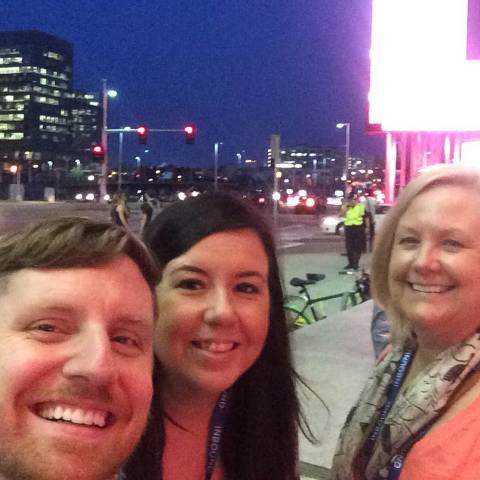

From the time that I started in Darlington's Communication Office last October, I was excited about INBOUND
After hearing my colleagues talk about their experiences at the conference, I was excited about INBOUND. Upon reading the lengthy list of world-renowned and respected speakers and panelists (i.e. Seth Godin, Chelsea Clinton, Jonah Peretti), I was excited about INBOUND. Even as I started to get an awful cold/allergy/attack/plague shortly before our jaunt up to Boston—yes, I was still excited about INBOUND.
On the heels of reading about the fun professional development opportunities taken by faculty and staff in other departments, I was excited to be doing the same—to remove myself for a moment from the routine and the familiar. Together with Director of Communications Tannika Wester and Database Manager and Marketing Coordinator Paige Hamil, we were thrown into the ring of the Boston Convention & Exhibition Center with over 14,000 other marketing professionals at the annual INBOUND Conference, sponsored by HubSpot.
What is inbound? Answering that question helps paint a better picture of this very targeted convention. Foundational to the inbound methodology—the heart of Darlington's marketing strategy—is the creation of interesting, relevant, helpful and quality digital content that draws in potential customers (in our case prospective parents and their students) and relating them with the product (this being Darlington, of course), all with the intent to marry the two together.
This is an overly-simplistic definition of inbound marketing, but you can be sure you will find endless infographics that explain the process more throughly: starting with someone who knows little to nothing about your brand and turning them into your biggest cheerleader.
You don't have to be in marketing to know that the playing field has changed. Sometimes I find myself so scattered that I don't remember what I had for dinner, or what my plans were for after work. Why? Because we have so many things competing for space in our brain—what's left of it anyway with our rapidly-shrinking attention spans. It isn’t rocket science. Do you find that traditional advertisements for products and services are more distractions now than opportunities? This is why an inbound methodology is so important.
Think of a traditional outbound marketing approach as a shouting match, or maybe a competition for limited resources:
“Buy this!”
"Want that!"
“Pay attention to me!”
Who wants to have to sift through all of that commotion?
In the contemporary marketing world it is all about building and cultivating relationships. You can’t scream your message everywhere hoping someone will listen. It is really more of a process that begins with attracting a customer to your brand through a website.
A digital presence that is properly maintained has the compelling power to tell the different facets of your story. An impactful web presence that is doing its job is one that is constantly refreshed with interesting content in the form of news stories, blogs, photo galleries and many other ways. There is something new to come back to every time.
Knowing and being able to relate to your audience will always be key to a successful marketing plan. A part of knowing who you are marketing to is knowing what they want, what they need—what their problems are and how you can help to solve them. Relevance is paramount to reaching customers, and you must demonstrate to them that what you have is what they crave.
One of the new concepts that I learned for the first time in Boston was that of unmarketing. It flows from what was probably my favorite breakout session of the INBOUND Conference, and was delivered by a strong proponent of unmarketing, Scott Stratten, president of a consulting business appropriately named…UnMarketing.
So what does that mean? Stratten explains it simply: “Stop marketing, start engaging.”
Stop marketing? But isn’t that what I am paid to do?
To engage…to involve, to engross. That’s what we are to do as we cultivate these customer relationships. We are to involve others in our philosophy, our culture—digitally reeling them in with great stories about our brand and encouraging them to hang around the space and ask questions.
Attending INBOUND gave me a much clearer idea on what the inbound methodology entails and why it has been a growing movement for nearly a decade. My "Beantown" experience has encouraged me to step back and really take a look at my work to see how I can be more purposeful with what I do each day as a content manager.
I do have to say that one of my favorite takeaways from my time in Boston—beyond the educational component and even beyond traveling to another city—was the chance to socialize with my Communication Office colleagues.
Over the last year I have become close with Tannika and Paige, having worked in such close proximity and, even more obviously, working toward similar goals as they relate to Darlington's public image. As one of the smaller departments on campus, we naturally are tight, but there is just something about breaking bread with your work family and getting to know each other outside of an office environment that creates and strengthens relationships. I think we are closer and stronger for it.
Since coming to Darlington it has ultimately been the relationships that continually keep my job new and exciting every time I drive onto Tiger Way. It seems only fitting that those same ideas, applied to a communications and marketing model, be the building blocks for how we share what makes Darlington such a special place—a place where it is all about the relationship.